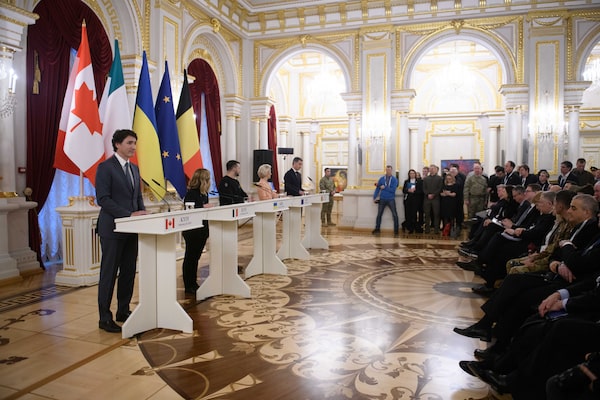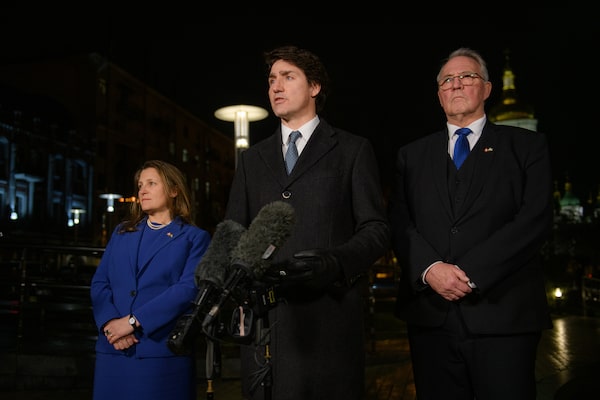
Prime Minister Justin Trudeau speaks at a joint press conference with Ukrainian President Volodymyr Zelensky and Western leaders in Kyiv on Feb. 24, 2024.Olga Ivashchenko/The Globe and Mail
Prime Minister Justin Trudeau signed a security co-operation agreement with Ukraine on Saturday that commits Canada to provide $2.7-billion in military and financial assistance to Kyiv this year, though nothing new in the way of the immediate weapons deliveries that Ukraine desperately needs as the war for this country enters a third year.
Mr. Trudeau, who made a surprise visit to Kyiv to mark the second anniversary of the start of the full-scale Russian invasion, hailed the 10-year pact as proof of Canada’s commitment to stand with Ukraine for as long as the war lasts, even as the Ukrainian military is still waiting for a U.S.-made NASAMS air-defence system that Canada promised and paid for last year, but which the U.S. has yet to deliver.
Most of the money Canada will provide is to come via $2.4-billion in loans that will be administered via the International Monetary Fund. The rest is $320-million in unspecified new military spending, with $75-million set aside to support ongoing intelligence co-operation, as well as demining assistance and funds to counter cyber threats.
“One of the great fears that I’ve heard from many, many Ukrainians is if there is a negotiated peace now or in a year to come, that’ll just give Russia a few years to remobilize, to rearm, and then to complete the job that they failed to start to complete,” Mr. Trudeau said following a virtual G-7 meeting that he and Italian Prime Minister Giorgia Meloni attended in-person in Kyiv, while the other leaders joined virtually. “We are demonstrating that Canada and other countries will be unflinching in our support for Ukraine over the long term.”
Canada and Italy, which signed a similar security deal on Saturday, became the fifth and sixth NATO countries to enter into such pacts with Ukraine, which is not a member of the alliance and has had to face the Russian invasion largely alone. As with the other bilateral security agreements, there was an immediate gap between how Kyiv and its partners interpreted the pact.
Ukrainian President Volodymyr Zelensky, at a joint news conference, referred to the deals with Canada and Italy as containing “security guarantees.” Mr. Trudeau and other NATO leaders have been careful to avoid the word “guarantee,” preferring to speak of “security assurances.”
What Ukraine needs most is an immediate delivery of the NASAMS system, as well as artillery shells for troops on the front line who are having to ration the number of rounds they fire even as Russian forces launch a fresh offensive. The $406-million NASAMS, which Canada announced in January 2023 that it was purchasing on Ukraine’s behalf, is still awaiting the signing of a foreign military sales agreement between the U.S. and Ukraine.
Mr. Zelensky nonetheless was emphatic in praising the support Ottawa has delivered, pointing to a new batch of 800 reconnaissance drones that Defence Minister Bill Blair announced last week that Canada would donate. “We have co-operated in terms of drones from the very beginning of the war. I wouldn’t like to go into details here, but Canada does have certain things and equipment, that countries do not have, and we use them, and we strengthened our drone fleet,” Mr. Zelensky said.
Mr. Zelensky said that his country would also look to Canada for leadership in rebuilding Ukraine, pointing specifically to the Nova Kakhovka dam that was destroyed by an explosion last year – creating an environmental catastrophe in the southern Kherson region – as one area he hoped Canada could help.

Prime Minister Justin Trudeau, Deputy Prime Minister and Minister of Finance Chrystia Freeland and Minister of National Defence Bill Blair attend a press conference in Kyiv on Feb. 24, 2024.Olga Ivashchenko/The Globe and Mail
Mr. Trudeau began his surprise trip on Saturday by attending an early morning ceremony at the battle-scarred Hostomel airport outside Kyiv, where he – standing alongside Mr. Zelensky and Ms. Meloni, as well as Belgian Prime Minister Alexander De Croo and European Commission President Ursula von der Leyen – observed a moment of silence for the Ukrainians who have lost their lives in this war.
The leaders observed a minute of silence on the tarmac, which was the scene of a key battle in the opening days of the war as outgunned Ukrainian troops repulsed an invading Russian force, foiling Russian President Vladimir Putin’s plans to quickly seize the nearby capital of Kyiv and install a puppet government. After the ceremony, Mr. Zelensky handed out medals to some two dozen Ukrainian soldiers for acts of individual bravery over the past two years.
“It was here that Putin wanted to win the battle of Kyiv, it was here the key defeat of his blitzkrieg happened,” Mr. Zelensky said, standing in front of the shattered hulls of several Ukrainian military transport planes that were destroyed in the ferocious battle for the airport. “It was here that we saw that any evil can be defeated.”
The battle of Hostomel is considered perhaps the most important of the opening days of the war. A flotilla of Russian helicopters appeared in the sky here early on Feb. 24, 2022, apparently expecting to face little in the way of resistance.
Ukrainian special forces troops, however, lay in wait, and shot several of the helicopters out of the sky before they could land. Although Russian forces were eventually able to briefly seize the airport, its tarmac was by then already too damaged by the fighting for the Russians to follow though on their plan to land a larger invasion force on the outskirts of the capital.
“President Putin has failed to achieve his strategic objective of subjugating Ukraine,” read a joint statement issued by the G-7 leaders after their virtual meeting. “We remain convinced that we can ensure the people of Ukraine prevail in fighting for their future and help to forge a comprehensive, just and durable peace.”
The G-7 communiqué also paid tribute to Russian opposition leader Alexey Navalny, who died Feb. 15 in an Arctic prison, and called on the Kremlin to clarify the circumstances surrounding his death. In remarks afterwards, Mr. Trudeau called Mr. Putin “a coward” and appeared to accuse the Russian President of ordering Mr. Navalny’s death.
“To execute one’s political opponents, to quash dissent by using police and military to make sure there is no opposition is the mark of a weakling, not a mark of someone who is confident in his own position,” Mr. Trudeau said.
However, he did not directly answer a question from The Globe and Mail about whether he would recognize the results of Russia’s March 17 presidential election, in which Mr. Putin is running effectively unopposed after the only anti-war candidate was disqualified.
 Mark MacKinnon
Mark MacKinnon